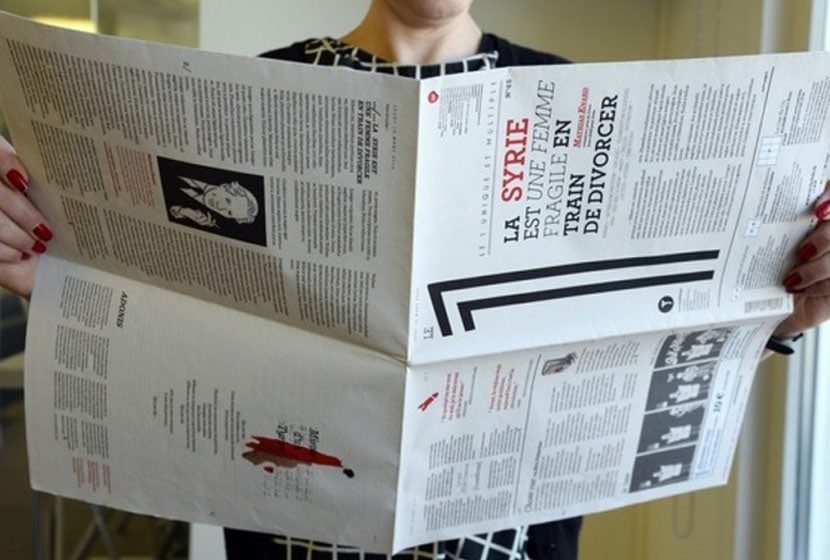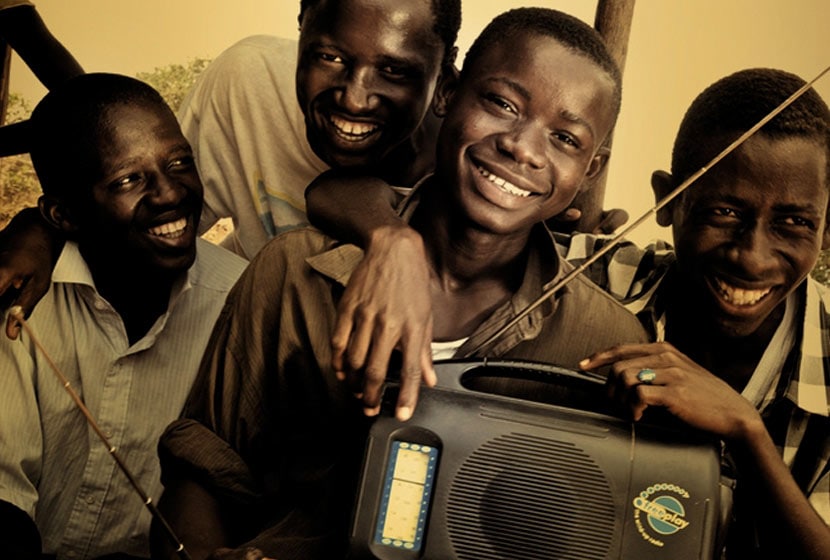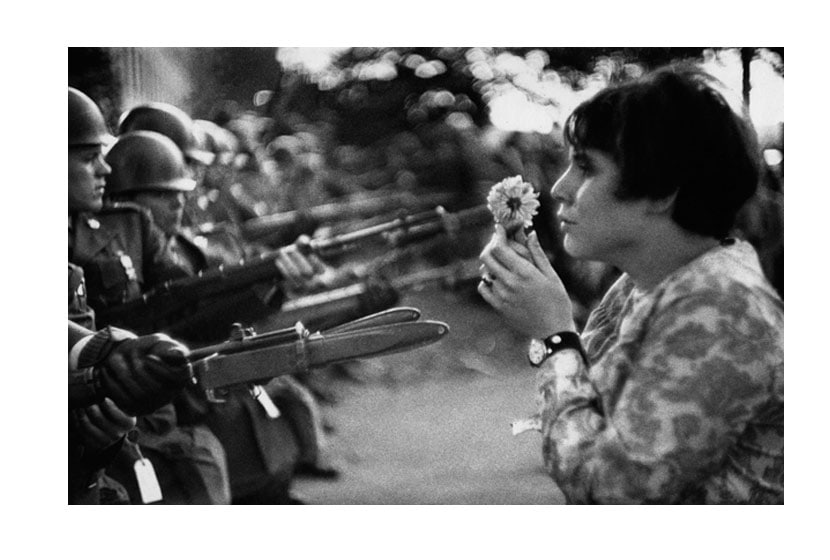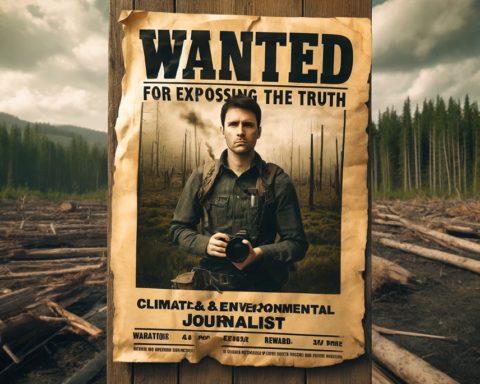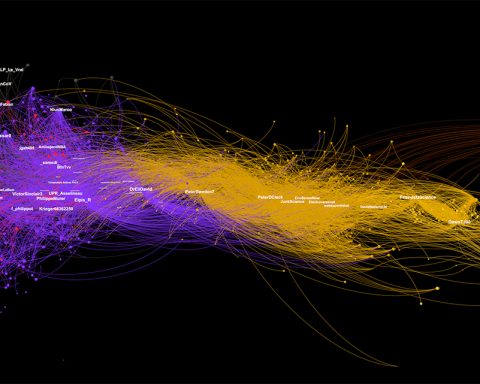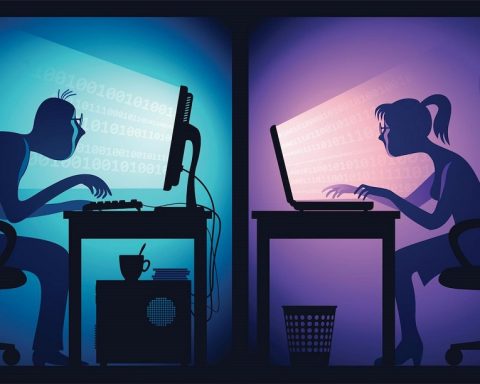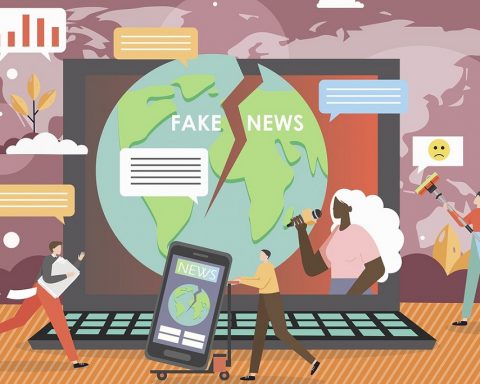This Wednesday, October 15, a new weekly magazine "Le" 1″ has just come out in our newsstands: a minimalist name like its concept which sounds a bit like Article 1 of Human Rights (the only one that everyone remembers and knows!).
What I like
 Its format is a simple educational concept: a large sheet of paper of 84 cm with 1 single subject per week from multiple angles and points of view (1 deciphering) and no advertising. On the site of the "1" you can read that the newspaper unfolds "like a large bird's wing in the turbulent sky of the print media". Indeed, on a single large sheet of paper, folded in eight, one can read a subject in three stages and take flight (judicious deployment of an idea).
Its format is a simple educational concept: a large sheet of paper of 84 cm with 1 single subject per week from multiple angles and points of view (1 deciphering) and no advertising. On the site of the "1" you can read that the newspaper unfolds "like a large bird's wing in the turbulent sky of the print media". Indeed, on a single large sheet of paper, folded in eight, one can read a subject in three stages and take flight (judicious deployment of an idea).
In an interview with La Croix, founder Eric Fottorino explains that his newspaper offers three "moments" of reading: "The first format, all folded (A4 format), invites a sensitive, emotional, literary approach to the subject. When you unfold it completely (tabloid format), you enter a second universe : that of analysis and expertise, with also philosophy... When you unfold it completely (road map format), it is an invitation to travel, to an elsewhere where imagination and rationality meet". . Finally, a media that integrates the economy of neuroscientific attention.
I wonder
In the light of the interview with Rifkin below I think that we are far from a marginal cost media! Far from the recognition of a collective intelligence, of maker thinkers ... you will discover that the weekly magazine is composed of many intellectuals, thinkers of the "old world" (I like some of them ...) but we are still stuck in a world of ideas that date from the Enlightenment and much too insular (France / Europe) ... I also hope that the weekly magazine will not fall into a Haiku version of the World ! And then this idea of luxury for the general public! You have to stop wanting to design everything! (cf the choice of the paper called luxury !)
How do I imagine the media?
Awareness media that inspire change and push for the transformation of an idea into action. Totally organic "living" media that are enriched by the contributions of everyone who evolves and grows: a subject could live from one to three years and be a trigger-incubator for projects!
Microfilm TV newsreels that make us spend "a day with": a day with makers, a day with a music virtuoso, a day with a hatchers; a day with actors of change around the world; a day with real people; a day with an artist, and so on. And a newspaper, a mag on mobile with several choices of format readings - bubbles of sensations thought (images / words) videos, images, in short, long, researchers version (with sources, real precise of links and references - personal is the format I would take but I am 0.1% representative of the population!
Media mirroring a mega planetary brain - an extended co-consciousness: a thousand and one intelligences for a thousand and one consciences and a thousand and one actions.
But by nature an optimist, I'm going to buy and follow the 1 that promises to inspire (so I'm in!) and I'll be one of those who totally unfold it by the way (which didn't rain in the metro this morning!) ... 1 for all - All for 1 -...
In the meantime, I invite you to read this article "how to re-invent one's work" interview with Jeremy Rifkin published in the "1".
Here are the key ideas that I retain centered on the changeover of economy with its ethics of We via the makers, the new face of social and business "liberators": 3D printing, Internet of things ... for the number of hours of work etc. read the article but it is only incidental in my view
As a reminder, Jeremy Rifkin has been appointed as the new President of the European Commission.conomist, author of The Third Industrial Revolution (2012) and many other notable essays. He is President of the Foundation on Economic Trends, which has been working since the late 1970s on economic, social and environmental issues. He has just published La Nouvelle Société du coût marginal zéro (The New Society of Zero Marginal Cost), published by Les liens qui libèrent.
Key ideas to remember
1 – The third industrial revolution corresponds to the gradual disappearance of capitalism in favour of a new economic system, based on sharing and collaborative communities.
2 - This transition, which is taking place before our very eyes today, is the consequence of the development of new technologies, in particular the 3D printer, which makes it possible to reduce considerably the marginal cost, i.e. the cost of producing an additional unit.
3 - Thanks to the "Internet of Things", the whole of humanity will soon be connected. Provided that the protection of personal data and the principle of Web neutrality are guaranteed, everyone will be able, on their smartphone, to take advantage of Big Data [exponentially growing digital data] and become a true prosumer, half-producer, half-consumer.
4 - A major transition in progress
5 - Some countries Germany, Denmark and China have grasped the challenges of this major change before anyone else.
6 - In France, the Nord-Pas-de-Calais region is ahead of the rest of the country. A certain number of industrialists are preparing for this transition, without completely abandoning the logic of the second industrial revolution.
7 - France: what means for the transition?
The government says that it does not have the budget to keep up, but that is not true. Every year, Europe invests EUR 780 billion in infrastructure that will become obsolete. With only 15 % of this budget, the Internet of Things could be operational by 2040. In addition, France has some of the best specialist electronics, information and communication technology industries, all capable of taking part in this great change. The country needs fresh air in its government. It needs to cross the political party divide and take a leaf out of the book from Germany, where socialists, environmentalists and Christian democrats have joined forces to promote this transition.
8 - Social solidarity economy of the 21st century (nothing to do with the social eco-market)
"It represents millions of organizations, cooperatives and institutions of all kinds, as well as billions of individuals who produce and share all kinds of objects and services for free. These organizations create social capital, which benefits a group as a whole rather than a single individual. This is something that machines are incapable of generating.
This sector is buzzing with activity and sees more and more people getting involved in areas as varied as health, education, culture and the environment. One and a half billion people already belong to cooperatives. Some are involved as volunteers, others as workers. If the social economy were to disappear tomorrow, society as a whole would collapse. In terms of job creation, it is the fastest growing sector in more than 40 countries: it accounts for up to 14 % of employment in some parts of Europe.
Maryline PassiniFounder and director of the forecasting agency Promote

